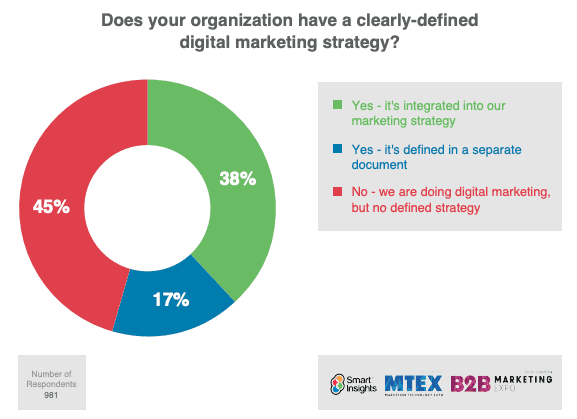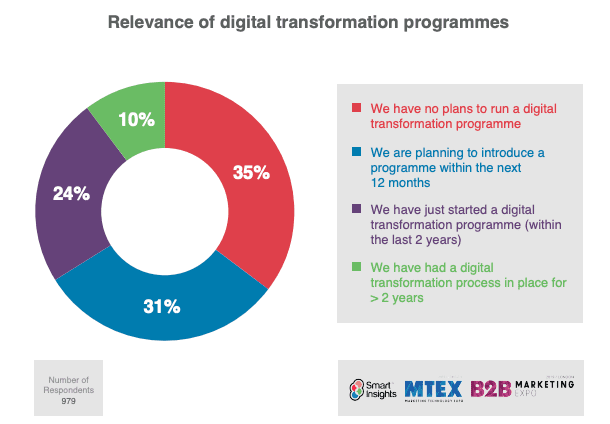Does your organization have a clearly defined digital marketing strategy?
Our survey of digital marketers this year found that many businesses still aren’t taking a strategic approach to digital marketing. In our Managing Digital marketing research in association with the TFM and the E-commerce expo, we asked last year “Does your organization have a clearly defined digital marketing strategy?”, and only 51% of the respondents said yes!
This year we wanted to see if people are getting better at thinking strategically about their digital marketing objectives and putting that strategy into action. We asked anyone who works in digital marketing to take our survey on managing digital marketing, which we ran in partnership with the B2B Marketing Expo and the Marketing Technology Expo.

Is a digital strategy essential?
So, 45% of companies are working on digital marketing with no clearly defined strategy it seems. This is actually an improvement on last year’s findings, which found that just under half (49%) of companies had no clearly defined digital marketing strategy. This may be because more businesses have realized the benefits of a defined plan now that digital marketing is growing even more in importance.
Does the fact that many organizations still don’t have a plan really matter? Well, certainly the beauty of digital marketing is that you can get results by focusing on the tactics like search, social media and email marketing plus working on conversion rate optimization for the website. In the sense that you can still get results then a strategy isn’t essential. But the larger the business, the more a strategy and governance are needed, as suggested by Dave Chaffey in his post 10 reasons your business needs a digital strategy.
We all know why it’s important to have a strategy and there are many day-to-day priorities and challenges that prevent us from formulating or delivering our plans. A digital strategy will also help with integration to avoid us creating a silo of digital resources and practice through digital transformation.
Is a separate or integrated digital plan best?
Although you may initially need a separate digital plan to help you create a strategy and get buy-in for investment in digital channels or to kick-start a digital transformation programme, it’s best to keep it well-integrated. That means supporting common business goals and keep them consistent with your brand and communication strategy. The long-term aim should be to integrate your digital plan into your marketing communications plan but with a separate plan, a practical interim approach, to gain ‘traction’.
Last year’s results show that many businesses have not yet started any kind of digital transformation plan. Some 37% said they have no plans to run a digital transformation programme. In comparison, 35% of businesses this year said that they aren’t planning a programme, showing that some organizations have realized the benefits.
While there is a decline in the number of companies planning on introducing a digital transformation programme in the next 12 months (33% last year compared to 31% this year), we’ve seen a rise in businesses that have just started a programme. This year, 24% of organizations had started their programme in the last two years compared to the previous year’s 21%. More companies have also had a digital transformation programme in place for longer than two years (10% versus 9%).

We see a digital plan as a short-term tool to define your digital future and help transform your business until it becomes part of planning for business as usual.
This research from Smart Insights in association with the B2B Marketing Expo and the Marketing Technology Expo explores approaches businesses use to plan and manage their investments in digital marketing. Findings and recommendations are designed to improve the commercial contribution of digital marketing.
